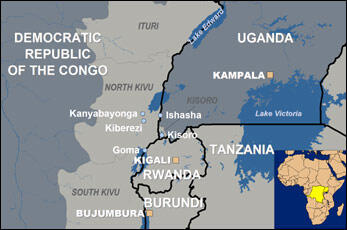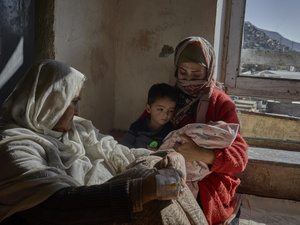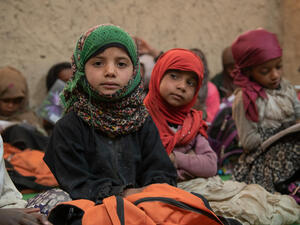Civilians caught up in DRC fighting tell UNHCR of atrocities committed against them
Civilians caught up in DRC fighting tell UNHCR of atrocities committed against them

Some of the thousands of Congolese refugees who have recently fled across the border and have been receiving assistance in Uganda. The situation is far worse for those who are internally displaced within the troubled DRC province of North Kivu.
KINSHASA, Feb. 10 (UNHCR) - Thousands of people are being forced to flee their homes in the Democratic Republic of the Congo (DRC) as fighting continues between the Congolese army and dissident forces in eastern North Kivu province.
In the space of a few days around 20 January, 20,000 people crossed into neighbouring Uganda. Most returned to DRC after a few days, but some 3,000 have asked for asylum in Uganda and have been moved to permanent settlements further from the border.
The influx continues. On Wednesday night, Ugandan authorities informed UNHCR that some 2,000 Congolese had just arrived in the border district of Kisoro, about 450 kilometres south-west of Kampala. The group went back to DRC the next morning, following a pattern of recent weeks in which people seek safety for the night in Uganda and return to North Kivu by day.
However, the vast majority of the civilian population affected by the fighting is not crossing the border. Instead, thousands of people are being displaced within North Kivu itself. UNHCR staff on the ground say the Kiberezi area, which has seen some of the worst fighting, is now almost empty. Its normal population is around 40,000, but there are now only about 2,000 people in the area.
Some 30,000 people have fled to the town of Kanyabayonga. Others are hiding in surrounding hills and forests, surviving in the bush with no shelter, water or food, and no possibility of getting any assistance. Their plight is of particular concern to UNHCR and other humanitarian organisations in the region.

"The extent of the violence and abuse faced by displaced people in North Kivu is extremely serious and very shocking," said Ralf Gruenert, UNHCR's deputy representative in DRC, who is currently in the eastern province.
"Villagers who returned to Kiberezi tell us that what they need most is security. They also lack water, food and shelter. These people who were forced to leave their homes and stayed in the region are far more at risk than those who managed to seek refuge in Uganda."
The situation in Kiberezi is a humanitarian tragedy. Displaced people are recounting atrocities committed against civilians, including killings, widespread looting and many cases of sexual violence. On Wednesday, a UNHCR truck evacuated seven seriously ill women and children from Kiberezi for treatment in Kanyabayonga. On Thursday, the truck went back to Kiberezi to evacuate eight people, including a 13-year-old, who had been raped and were in need of medical attention.
While the displaced fear that violence and insecurity will continue, many say they want to go back to Kiberezi, where at least some food is available. This is not the case now in Kanyabayonga, let alone in the bush.
While the situation in North Kivu is extremely worrisome, other parts of eastern DRC are also affected. In Katanga province, further south, tens of thousands of people have been displaced by continuing violence. Atrocities against civilians, including rapes, murders and house-burning, have also been reported.
"Security is the key to the protection of civilians and to the delivery of adequate humanitarian assistance," Gruenert said. "The protection cluster led by UNHCR together with MONUC (the UN Peacekeeping Force in DRC) is raising this matter with all concerned actors and emphasises that the government needs to take its responsibility and fulfil its duty to protect civilians."
At least 1.7 million people are internally displaced within DRC, most of them in the east of the country. Under a UN plan to strengthen protection and assistance to internally displaced people (IDPs), UNHCR is deploying staff to the eastern provinces to help coordinate the IDP work of UN agencies, NGOs and the Congolese government.
The refugee agency already has IDP protection staff in place in South Kivu and Katanga and will be establishing a presence in Bunya, Ituri and Goma in North Kivu province. UNHCR's deputy representative in DRC is in North Kivu to assess what can be done within this UN collaborative approach to improve the human rights situation for displaced people.
The United Nations has assigned UNHCR sectoral responsibility for IDP protection, camp coordination and management, and emergency shelter in displacement situations caused by conflict. Within this collaborative approach, UNHCR is currently working on three IDP pilot projects - in the DRC, in Uganda and in Liberia, where it already has a significant protection role.
Traditionally, the world's millions of IDPs have been one of the most vulnerable groups in situations of war and conflict since they do not come under the specific mandate of any international body.









